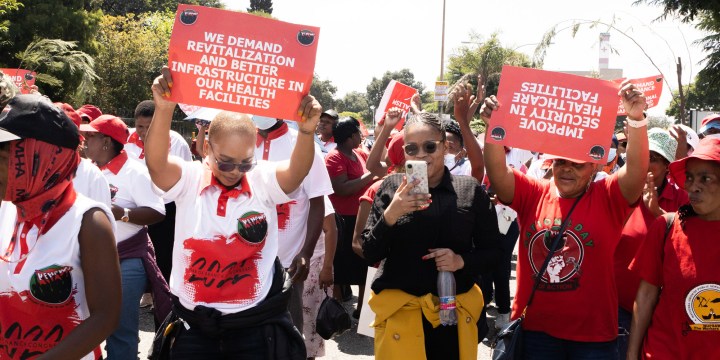WAGE NEGOTIATIONS
Government and public sector trade unions on the verge of sealing 7.5% pay rise deal

Trade unions representing the majority of public servants in SA are prepared to accept the government’s offer to increase pay by 7.5% during the 2023/24 fiscal year, followed in 2024/25 by pay adjustments linked to the consumer inflation rate.
The government and trade unions are close to concluding an agreement over the pay rise of 1.2 million public servants over the next two years, which could bring an early settlement to compensation negotiations in the state.
Trade unions representing the majority of public servants in South Africa are prepared to accept the government’s offer to increase pay by 7.5% during the 2023/24 fiscal year. Unions bosses canvassed by Business Maverick said a pay rise deal with the government was set to be signed within days, bringing an end to compensation negotiations.
There has been a compromise on both sides.
The government initially offered public servants a pay rise of 4.7%, but sweetened its offer to 7.5% to prevent drawn-out negotiations or worse, public servants from embarking on a prolonged strike. Implementing the improved offer will be costly for the government, which budgeted R701.2-billion in 2023/24 to pay public servants including nurses, doctors, teachers and police officers. It might cost the government an additional R50-billion to implement its latest pay rise offer, going against its plan to stabilise the remuneration bill, which is the biggest fiscal risk to the budget.
Trade unions initially demanded a 10% rise in the pay of public servants and later reduced their demand to 8%. But by all accounts, trade unions are willing to settle at 7.5%. The trade unions include the SA Democratic Teachers’ Union (Sadtu), National Professional Teachers’ Organisation of SA (Naptosa), the teachers’ union Saou, Health & Other Services Personnel Trade Union of SA (Hospersa) and the Public Servants’ Association (PSA).
Together, these unions form a 53.9% majority at the Public Service Coordinating Bargaining Council (PSCBC), where they have been negotiating with the government about pay rises and conditions of employment in the public sector.
Trade unions at the PSCBC surveyed their members about whether to accept or reject the government’s 7.5% offer by embarking on a mandate-seeking process, which ended on Friday, 24 March. Preliminary results of the survey or the mandate-seeking process indicate that most public servants are willing to accept the government’s 7.5% offer, according to the bosses of trade unions at the PSCBC.
Reuben Maleka, the assistant GM of the PSA, told Business Maverick: “We have finalised our mandates on Friday and we are now counting and consolidating. However, preliminary counting shows positive [signs] that members accept the offer.”
Basil Manuel, the executive director of Naptosa, also believes that there will be a “positive outcome” regarding a pay rise deal. This is because Naptosa and Saou members have largely accepted the 7.5% offer.
The general secretary of Sadtu, Mugwena Maluleke, said: “We are also getting the signals that from the mandating process the workers might agree.”
But pay rise negotiations are complex and the parties involved could walk away at the eleventh hour if they are unhappy with compensation benefits. It is understood that trade unions will continue to count and consolidate the feedback from their members on Monday, 27 March, and Tuesday, 28 March. The official outcome could be announced before the end of the week.
The government has offered public servants a two-year compensation deal. For 2023/24, the government has offered public servants an average 7.5% increase in their pay, which is to be implemented from 1 April. Public servants will be offered a housing allowance increase in line with the consumer inflation rate. And in the second year (2024/25), the pay of public servants will increase with the expected inflation rate, but capped at 6.5%.
Should a settlement be reached, public sector negotiations would have been settled in record time. A decision taken by trade unions at the PSCBC will be binding on all labour constituents. Other trade unions joined discussions at the PSCBC late because they embarked on an indefinite strike but recently reached a deal with the government to end the strike.
Read more in Daily Maverick: Nehawu ends strike by healthcare workers after reaching a settlement with the government
Those trade unions include the National Education and Health Workers’ Union (Nehawu), the Police and Prisons Civil Rights Union (Popcru) and the SA Policing Union (Sapu). Their members stand to benefit if the majority of unions at the PSCBC accept the government’s 7.5% offer. DM/BM




















 Become an Insider
Become an Insider
So whilst the rest of the population struggles with inflation, government employees, the cause of the problem, don’t have a care. The 120m government employees who haven’t bothered to do their jobs or even pitch for work and who stole, bribed and grafted their way also have a pay rise and we should be applauding – how extraordinary that this is the one thing they manage to get right – quick negotiations with the trade union representing their own pay increases. This government never ceases to amaze me.
Same old, same old. Ritual dancing figuratively and literally. Government caves in, against Treasury advice, and the striker’s poor behaviour is rewarded.
it is surprising that the administrators on R2m packages did not, in the interest of promoting income equality, forego their increase in favor of the R200k people getting a decent increase.
I read somewhere that SA spends more on administrators than SA spends on nurses + teachers + police officers in aggregate.
Can DM perhaps do POPI to government and ask for a simple breakdown of the number of government employees and the total spend broken down:
Under R200k,
R200k to R300k,
etc etc
ending with the number paid over R1.8m a year?
“Government employees” to include national and provincial government but also 100% SOE and Agencies…